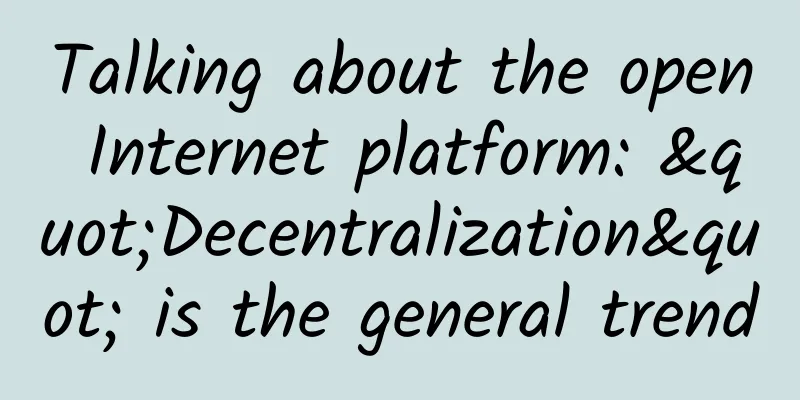Talking about the open Internet platform: "Decentralization" is the general trend

|
A few days ago, I talked with a friend about crowdfunding cafes, and he told me a very unique case of crowdfunding cafes. This case also triggered some thoughts on the current openness, decentralization and centralization of the Internet. Today I will simply write it down and share it with you. A case study of a crowdfunded coffee shop with no purpose of making money Crowdfunding coffee shops don’t sound very new. There is nothing more than a sponsor who finds a group of people to invest in the coffee shop, and then makes a profit through the coffee shop, and then the crowdfunders share in the profits. The sponsor of the crowdfunding project is the largest shareholder of the coffee shop and has ownership and management rights to the coffee shop. But the crowdfunding coffee shop case I want to talk about today is completely different from ordinary crowdfunding cases. This special crowdfunding coffee shop project was initiated by a group of Peking University graduates, mainly those born in the 1970s, who are in a good period of career development. They are a group of people with money, resources, and want to continue to climb the peak of their careers. The first batch of crowdfunding participants each contributed RMB 30,000, and a total of 100 people participated, raising a total of RMB 3 million. Then the second batch of crowdfunding participants were recruited, with each person contributing RMB 50,000. A total of 100 people participated, raising a total of RMB 5 million, for a total of RMB 8 million. Each of the 200 crowdfunding participants holds one share of the cafe, and the ownership of the cafe does not belong to any one person. Then, each of the 200 crowdfunding participants is given coffee coupons of 30,000 and 50,000 yuan, which can be used to consume in the cafe. At the same time, the operation of the cafe is all operated by a professional external team, and the 200 crowdfunding participants do not participate in the specific operation. In addition, the 200 crowdfunding participants are divided into groups of 10 people each, serving as the rotating management of the crowdfunding cafe, supervising and reporting on the management, finance, and operation of the cafe. Many people may wonder, isn’t this cafe planning to make a profit? Why are the 200 crowdfunders so stupid? In fact, this is the special feature of the crowdfunding cafe. The 200 crowdfunders are all alumni of the prestigious Peking University, born in the 1970s, and have achieved some success in their careers. They don't feel overwhelmed even if they lose 30,000 or 50,000 yuan. More importantly, through the cafe platform, these 200 people with money, resources and dreams are brought together, allowing them to share resources and realize their dreams together. The cafe also has an unwritten rule that after crowdfunding participants use the platform's resources to complete a project and make money, they can donate a portion of the money to the cafe. This is considered a reward for the platform, but it is not a mandatory rule. Openness, decentralization and centralization behind the crowdfunding cafe case From the crowdfunding case above, we can see that this is an open coffee shop, where 200 people hold equal shares, which is very equal and democratic. This is like the United States, where everyone has the right to vote, which is a spirit of openness and freedom. However, openness is also limited. Not everyone is eligible to participate in crowdfunding. You must be a Peking University alumni, born in the 1970s, not short of money, have resources, and have dreams, but still need to struggle. This kind of openness is actually a screening of the capabilities of partners, which is the basis for the healthy development of the platform. The cafe has no major shareholder, and all shareholders do not participate in the operation. Instead, a professional team is hired to run the cafe, with a 10-person rotating management team, transparent and simple rules and finances. This is actually a decentralized thinking, because the owner of the cafe does not belong to any shareholder. But we can also feel that these 200 crowdfunding participants are supporting the cafe, and the cafe platform itself is very centralized and authoritarian. With the participation of 200 shareholders, we hope that the cafe will always be crowded, more projects will be born on this platform, and more funds can be donated to the cafe to keep it going. This will provide these 200 shareholders with more resources, better communication venues, and the expansion and maintenance of a wider network of contacts, allowing the entire platform to continue to prosper. The inspiration that crowdfunding cafes bring to the Internet open platform This crowdfunding coffee shop case also brings a lot of inspiration to the Internet open platform. First of all, openness is necessary, but it does not mean openness without barriers. At present, Tencent, Baidu, Alibaba and other Internet companies are all building open platforms. Openness is a good thing, but openness must be limited and have barriers, so as to ensure the continuous excellence of the platform. So I see that some people criticize Tencent, Baidu and other open platforms for having too many restrictions, and even encourage full and unlimited openness. Obviously, this is unreasonable. Secondly, decentralization is not an end, but a means. We see that crowdfunded coffee shops are built on decentralization, but from the perspective of the coffee shop itself, decentralization is only to make the coffee shop's management model, business methods, financial system, etc. more transparent and advanced. In fact, it is a kind of commercial civilization, but the result is still that the coffee shop as a subject will exist forever, continue to grow, and become more and more powerful, which is itself a kind of centralization. Decentralization is always aimed at more centralization. The same is true for current open platforms, whether it is Baidu or Tencent's WeChat, the main purpose of their openness is to attract more partners to provide services to users on their platforms, forming a competitive barrier with opponents, and thus becoming more centralized, or monopolistic. Monopoly is not a daunting word. It is the goal pursued by all businesses and the most efficient organizational form in the Internet industry. Kevin Kelly once elaborated on this view and analyzed the differences between the Internet, a special form of business, and traditional commercial monopoly. I will not elaborate on this here, but just want to correct the mistakes of some people who regard decentralization as a goal, because decentralization is the best means to achieve centralization. Thirdly, the advantages and problems faced by several current open platforms. If we examine the current Baidu, Tencent, Alibaba, and even Xiaomi from the case of the crowdfunding coffee shop, we may be able to see their advantages and problems. From the perspective of centralization, if the purpose of any open platform is to centralize power, then Tencent is undoubtedly the most advantageous. WeChat and QQ occupy almost all of the time people spend online. The inherent network ID advantage makes it easier for Tencent to obtain sticky users and form user centralization. Baidu and Alibaba do not have such conditions, so they cannot centralize power at the user level. However, Baidu and Alibaba are better than Tencent in centralizing power at the enterprise level because of their advantages in accurately connecting enterprises and higher connection efficiency. Currently, BAT is making up for their respective shortcomings. But I don’t think their approach is correct, because any practice of plugging a “power strip” on one’s own platform is not a decentralized approach, and will inevitably bring about serious problems in efficiency, experience, and profit distribution. Only a “decentralized” approach can make products and services more able to meet demand and go more smoothly. Therefore, in terms of decentralization, we should learn from the model of crowdfunding cafes. What you open up to your partners are resources, technologies, and capabilities, rather than complete control over them or staking out territory. Take Tencent as an example. WeChat always hopes to become the center that connects everything. From Tencent's perspective, this idea is not a problem, because only as much centralization as possible can bring higher barriers and benefits. But is WeChat really omnipotent? Can it really connect everything? At the Tencent Global Partner Conference, they used "Open, Connect Everything" as the theme. I said in my Moments, "It should be called, open, everything can be connected." It seems that I just changed the order of the words, but it is actually a different attitude and path to achieve centralization. The theme of "connecting everything" means that WeChat is an omnipotent power strip and the center of all partners. Obviously, this idea is too idealistic. If it is really done, the result may not be ideal because of various problems such as efficiency, experience, and scenarios. But if it is changed to "everything can be connected", it means that Tencent outputs resources and capabilities to help companies connect. For example, open login is a good way, and even open relationship chains in the future are not a bad idea. Opening up to hardware manufacturers is also a decentralized way. Some traditional industries have deep technical and industry barriers. The Internet, an advanced tool, should be responsible for enhancing the core competitiveness of traditional industries, and the core of this cooperation is still the traditional industry itself. This process of mutual integration can inevitably avoid various problems such as efficiency, experience, and scenarios. This is like a crowdfunding coffee shop. It does not require the projects of the 200 crowdfunders to be linked to the coffee shop. The core of the project itself is still the coffee shop itself, not the coffee shop. The coffee shop only provides resources and venues, but this makes the coffee shop indispensable and will never disappear. It is also the common "king" of the 200 crowdfunders. This is actually the greatest centralization achieved through decentralization, and all enterprises in the ecosystem are convinced and willing. Let's look at Baidu. Since Baidu does not have a very sticky network ID, and Baidu has previously been doing a business that relies on decentralization to achieve centralization - advertising alliance. Therefore, Baidu's weak ID in the form of search forced Baidu to consider the issue of decentralization. Therefore, Baidu first madly deployed apps, and deployed search entrances on multiple apps such as search, maps, browsers, input methods, application distribution, videos, Baidu Cloud, etc., and snatched users' Internet scenes through a decentralized strategy. Therefore, the total number of users in the Internet scene is also a very large number. Tencent, almost all of its bets are on WeChat and QQ. So it seems right for Baidu to start with decentralization and then open up. The problem Baidu faces now is how to effectively manage these entrances to form a closed loop, so as to establish its position as a "coffee shop". After all, the ultimate goal is still centralization. Therefore, the subsequent new advertising business, payment, and finance must keep up, which is also the biggest challenge it faces. Alibaba's payment business has taken a decentralized approach to make itself king. This is a typical case of achieving centralization through a decentralized approach. This terrible ability of payment to be everywhere is indeed the biggest headache for Tencent and Baidu. It is impossible to succeed by copying the model of Alipay. The only way is to find a new way, such as scene payment based on social and search services, and slowly erode Alipay. Although Alibaba went public by relying on its e-commerce business, e-commerce is a product that is inherently centralized, which is Alibaba's accumulated advantage in e-commerce. Tencent hopes to challenge Alibaba with decentralized e-commerce. Tencent's decentralized e-commerce is actually a new way of thinking. The main difficulty now is how to create a brand-new business rules and business atmosphere, and how to make WeChat business have a better shopping scene. Once Tencent finds the way, Alibaba will face severe challenges. If it succeeds, it will also become a classic case of decentralization defeating centralization. From this, we can draw a conclusion that the decentralized approach is more advanced than centralization, and centralization achieved through decentralization is more stable and more in line with the trend. This is also worthy of careful thinking and research by the CEOs of BAT. Perhaps this represents the future. As a winner of Toutiao's Qingyun Plan and Baijiahao's Bai+ Plan, the 2019 Baidu Digital Author of the Year, the Baijiahao's Most Popular Author in the Technology Field, the 2019 Sogou Technology and Culture Author, and the 2021 Baijiahao Quarterly Influential Creator, he has won many awards, including the 2013 Sohu Best Industry Media Person, the 2015 China New Media Entrepreneurship Competition Beijing Third Place, the 2015 Guangmang Experience Award, the 2015 China New Media Entrepreneurship Competition Finals Third Place, and the 2018 Baidu Dynamic Annual Powerful Celebrity. |
<<: In the mobile era, the opportunity for community 3.0 has arrived
>>: Xiaomi valuation topic: Please learn how to do public relations from Lei Jun
Recommend
The so-called capital winter is nothing but the collapse of wishful thinking
Last year, we mentioned that winter is coming. Th...
New AI real-person intelligent virtual anchor, video creation tool!
The software provides 7 artificial intelligence vi...
OPPO Find7 Lite Edition Review
The OPPO Find 7 released this time includes a sta...
“After a full meal, you have a second stomach for dessert”, is it true?!
I don’t know if you have ever had this experience...
Hi nova 11 mobile phone review: The budget is well spent, and its strengths are gaming, photography and battery life
The mobile phone market has entered a highly comp...
A guide to filling out the application form for the 2020 College Entrance Examination. How to fill out the application form for the 2020 College Entrance Examination?
As the old saying goes, "30% of the test and...
Xiaohongshu KOL promotion: the secret of popular notes!
As self-media and internet celebrities became mor...
It’s the last month, try harder!
After today There is only one month left in 2021 ...
What impact will it have on Chinese mobile phone manufacturers as Google enters “retaliation” mode?
[[247942]] Introduction Since the beginning of th...
Where will Changhong’s state-owned enterprise reform path go in the future?
In the era of mobile Internet, companies seeking ...
Taihang Mountains are so beautiful!
Tai means big Walker, shape Taihang Mountains It ...
After the Elephant Trunk Rock broke and fell into the sea, how many other landscapes are "trembling"?
On the afternoon of December 16, 2023, accompanie...
A guide to advertising in the beauty industry
Today, let’s share the “Juliang Qianchuan Beauty ...
React mobile enterprise data project practice
Course Description This project starts with getti...
How to do effective “user segmentation”?
The establishment of an effective user segmentati...









